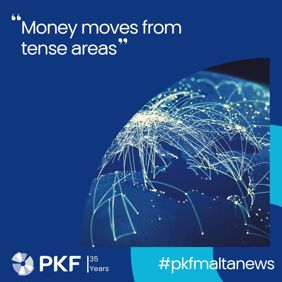Money moves from tense areas
Author: Ovidiu Tierean - Senior Advisor at PKF Malta
Published on Business Now: 27th October 2023

The world at the end of 2023 is not one without geopolitical and economic tensions. After more than two years of pandemic, countries are making efforts to recover and align to the new global context. One marked equally by the rise of AI, but also by trench warfare, with tanks on the ground and drones in the air. In this context, money is still moving, but more carefully, with companies looking to invest in countries that cannot be derailed overnight from democratic values. Is globalisation coming to an end? Analysts are shying away from answering, but Wall Street giants and important leaders in key economic fields are using the word “geopolitics” when talking about new investments. It is a term used no less than 12,000 times during 2023, almost three time more than just two years ago.
Companies are looking much more carefully when it comes to investment, and most discussions of development and expansion are inevitably linked to international relations. Relations that are increasingly strained and that show that talks about the end of globalisation were not just talk in the wind. Corporations choose to move their capital to safe areas. It is a changing trend, after years when they only pursued huge profits and chose developing and marginal markets from which they could squeeze most profits. Now, with global tensions, sustainability matters more than short-term profit. It is one of the reasons why big companies choose to make their future in countries with similar mentalities and common visions of democracy, human rights, and the rule of law. Cheap manpower is redundant if operations are affected by war, government bans, or blocked accounts.
Figures show a world economy in which rival blocs are emerging that, while still tied to old investment, are reconsidering their next capital moves. Foreign direct investments made by UN member countries show that in 2022 of the 1.2 trillion dollars, a very small part (180 billion, to be exact) went from countries that refused to condemn the Russian invasion to those that did. For reference, the countries that condemned Russia’s invasion represent more than two-thirds of global GDP. And that matters in the movement of capital around the globe. Building on UN votes on Russia’s invasion of Ukraine, the global share of foreign direct investment going to countries that did not condemn the invasion averaged just 15% over the past two years, down from 30% in the period 2009-2019. China’s share, including Hong Kong, has fallen to less than 2% in 2022, from nearly 11% on average over 2010-19. Investments in Russia did not exist at all.
During the pandemic, governments put pressure on companies to take national interests into account. They resorted to various state subsidies and financial incentives to make them keep their production within the borders. Above all, Russia’s invasion of Ukraine and an increasingly fierce battle for global economic supremacy between US and China hastened the end of a decades-long, post-Cold War model that analysts considered highly unsustainable. Political leaders, including those in Europe, are rightly concerned. At the beginning of the year, the president of the ECB, Christine Lagarde, said it directly, without shying away from the consequences: “We are witnessing a fragmentation of the global economy into competing blocs, each bloc trying to draw as much of the rest of the world closer to its strategic interests and respective shared values”. It is a direct signal that the world seems more divided than ever.
Many economies of the world seem solid now, but the problem is the complicated relations between them. The war in Ukraine, economic sanctions, but also the trade war between the US and China caused disruptions. Although global trade is still holding up, these disruptions cannot be ignored. Economies try to overcome them because of the desire to make a profit. US and China have started a trade war, but leave room for economic reconciliation when appropriate. An example of this is the visit of the US Secretary of Commerce, Gina Raimondo, to China. On the other hand, the Chinese are looking much more closely at Europe. Chinese companies making electric cars are rushing to enter Europe, although this has sparked an EU investigation into Chinese subsidies.
IMF economists have recently been talking about a major shift in investment decisions, generically called “geopolitical distance”. This means, among other things, that capital flows, as foreign investments, tend to go to countries that have the same geopolitical visions and not necessarily to geographically close countries.
Beyond wars, classic or commercial, the world seems more divided than ever and not just from an economic point of view. It is only one of the layers, the one that can be seen and that can be contextualised, with figures, analyses and concrete data. The picture is much bigger: there is climate change that threatens to tear down everything that has been built. The world economy will more than likely adjust. But the process has begun and will leave deep traces.
Author: Ovidiu Tierean - Senior Advisor at PKF Malta
Published on Business Now: 27th October 2023
